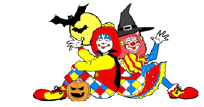Your clown character is extremely important in any kind of performance, and hospital clowning is no exception. We’ll concentrate on this kind of clowning as usual.
To discover your clown, you must take several things into consideration. First, notice that I said “discover”; in other words, your clown is already in you. That is where you must begin in order to develop a genuine character. Next, you must interact with several partners to find out your comedic “status”. Examples of “status”: high - in charge; low - a bit dense; mid - does well with help (shifts slightly depending on partner; this clown must be great at supporting).
Your talents and skills may help you along your journey. For example, if you are a magician, you can be a mischievous clown. If you are a juggler, you can be a confident ring-master type. If you are not yet skillful but you are an actor, you can partner with a skilled clown and have childlike curiosity and enthusiasm. (Or you can throw all this out the window and develop characters like the ones in the The Good Juggler!)
Once you’ve discovered your clown’s personality, you should write a short biography about your clown. This will help you give the clown a reason to behave a certain way. You’ll also begin to picture a costume design, but a customized lab coat should be your first project. (More on costuming and the lab coat in a future post.)
As I stated in the The Hospital Face, makeup for hospital clowning cannot be applied like you'd apply makeup for a circus show. You must keep it at a minimum, using your own facial features. It should bring out your personality, not appear mask-like. We were taught to make faces in front of a mirror and then decide what features we would emphasize and if we will paint a nose on or attach one. There should be no more than 3 or 4 different colors on your final face.
Eventually, you’ll become very specific with your clown’s costume, makeup, personality, skills and specialties. You will also be able to name your clown accordingly.
No matter where the road takes you, make sure you are approachable, non-threatening and fun. Hospital clowning is always about the patients; we are simply one of many vehicles through which to lift their spirits.
 Lucy E. Nunez has been a theatrical performer since 2002 and an improv performer since 2003. She created Nurse Lulu for the Big Apple Circus Clown Care program in 2014. She is now Baptist Children's Hospital first-ever resident clown! For more information please visit: www.sunnybearbuds.wix.com/buds
Lucy E. Nunez has been a theatrical performer since 2002 and an improv performer since 2003. She created Nurse Lulu for the Big Apple Circus Clown Care program in 2014. She is now Baptist Children's Hospital first-ever resident clown! For more information please visit: www.sunnybearbuds.wix.com/buds

1 comment
Great advice, Tanx.